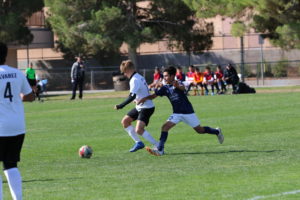DOWNTOWN LAS VEGAS SOCCER CLUB
We Develop • We Inspire • We Achieve

Winning the Game. Is It That Important?
YES, Winning is Important
We play the game to win. That is why we play and have fun. If you just did it to keep fit, it would get pretty boring. Competition is in our nature. It is wired into our brains to compete. But having a teams success measured by winning, does not develop great soccer players.
So, can we play in a world where winning is not the top priority, but a result of player development? You bet we can.
Player Development vs. Winning At All Cost
We all want to win. It brings great joy to be the champion at a tournament or to beat your rivals. It makes us feel good about ourselves and our performance. A coach who makes a key substitution or calls for a practiced set piece will share in the success because of their involvement in the victory. Parents too can feel the joy of seeing their player’s accomplishments. Even a poor performance or poor effort is overlooked when everyone is relishing the team’s success. However, coaches, players, and parents need to understand that winning needs to be a by-product of development rather than a reason to play.
What does “Win at All Cost” look like?
You will see it all the time, particularly at younger to middle ages. Teams with superior athletes and speed will win, while the teams that are focused on skills and techniques will lose. Win at all cost teams put the fastest or most mature players up top and hope for their heroics, neglecting everyone else’s contribution. Coaches with the win at all cost mentality will bench weaker players, or even worse, bring on guest players for the sole purpose of winning. The worst examples are when coaches use illegal players or use other methods to cheat to win. The fruit of those victories is tasteless. The good news is that around the age of 13 and 14, the teams that are devoted to player development and proper technique will start to beat win at all cost teams. The parents of a win at all cost team will be disappointed when their players quit at around the age of 15 because they were never taught the correct technique or skills.
It is the Journey, Not the Destination
So the first thing anyone asks after a game is “who won?” If you won, you played well, and if you lost you played poorly.
Good coaches will know if a team performed well regardless of the result. Coaches must make the decision to develop players for the long term and perhaps at the expense of early victory gratification. Parents too must know the goals of the coach so that when the team does lose, it is not a measurement of the player’s success as a soccer player.
The focus of the coach may be to have the players try to play quicker by limiting their touches to one or two touches before making a pass. While they are developing these skills, the team will undoubtedly make mistakes that could cause the loss of a game. However, the experience of playing under pressure and being forced to perform a skill that will inevitably become one of the most important skills to have. Games can provide incredible learning experiences., and loses, are just as valuable as wins.
Converting the WIN mentality to Destination Mentality.
You should compete to win and do everything you can within your play to do so. But the coach’s primary focus should be to teach the players how to win. There is a bigger picture, and it is the coach’s job to communicate that to both the players and the parents, otherwise, a loss will appear as a failure. It is also very important that parents see an improvement, particularly if they are paying to have their player trained by the coach. Winning organically comes from a well-executed long-range plan. Well organized training, and individual commitments from players to work hard and practice what is taught. Teams, where winning is the only focus, will not see the commitment from all of the team players.
Coaches need to get the parents on board right away as to what the expectations fo the team are. Is the goal to win the state championship or to develop each player to a level to where they can play college or professionally. You will find that if you r train for the later, the state championship will come.



